Koncar Revitalising Greek Messochora Plant After 20 Years of Waiting
December the 6th, 2022 - The well known Croatian company Koncar is an internationally recognised leader, and it has been working intensively on the creation of new or the revitalisation of old energy plants for around 100 years now. The revitalisation of a plant in Greece is now in the works.
As Poslovni Dnevnik/Darko Bicak writes, in very few segments of the global market does Croatia occupy such a large share as it does in the energy sector, especially in terms of transformers and hydropower plants.
The biggest name in this field is undoubtedly Koncar, which has been working on new or revitalising existing energy capacities for about 100 years, and the latest example of this is over in Greece. To speak more specifically, Koncar recently signed a contract with the Greek electricity company (Public Power Corporation - PPC) in the capital of Athens for the first phase of the revitalisation of the Messochora hydroelectric plant in Greece.
The first phase of the works
Several Koncar Group companies, led by Inzenjering/Engineering (KET), will participate in this Greek revitalisation project. As part of the first phase of the revitalisation of this plant, the testing and analysis of all of the equipment at the hydroelectric power plant will be carried out, and all of the preparatory work will be done for the first commissioning of this plant.
As explained by Gordan Kolak, the president of the Koncar Management Board, the HE Messochora project was initially contracted in the years following the end of the Homeland War, back during a period when the Koncar Group was working very intensively to return to its former markets, which included that of nearby Greece.
"We won't be exaggerating by saying that this particular project was particularly crucial for Inzenjering, but also for other companies from within the wider Koncar Group," said Kolak. It regards a plant with an installed capacity of 2x90 MW, the equipping of which (with all kinds of electromechanical equipment) was contracted by Koncar back in 1996 amid strong international competition on a "turnkey" basis.
The implementation of the project lasted from 1996 to 2002, with Koncar successfully fulfilling all of its contractual obligations, and the equipment was delivered and installed within the given deadlines. However, PPC faced certain administrative problems due to which it could not fill the reservoir with the water required for testing, and ultimately ensure the operation of this plant.
Therefore, in agreement with PPC, the equipment was finally taken over and preserved so that the project could continue when the conditions for it were properly created. Few expected that this would happen only after a twenty whole years, after Koncar, following several months of negotiations with PPC, finally signed the contract by which it returned to this Greek hydroelectric plant.
"Taking into account the attitude of our Greek partner who wants to put this plant into operation with as much originally produced equipment as possible, it's evident that this is an extremely large technological and engineering challenge, because in the meantime, several technological changes have taken place on the market for many types of installed equipment, which is typical for the passage of this amount of time. Therefore, members of Koncar's teams from the original phase of the plant's construction will participate in the work on the ''new'' Messochora. These kinds of challenges are at the very core of Koncar's expertise, performance according to special customer requirements and the adaptation of equipment and systems of different generations,'' said the Zagreb-based company.
To date, Koncar has secured references in as many as 130 markets around the world and delivered more than 400,000 transformers of various types, voltage levels and powers, fully or partially built and revitalised tens of thousands of transformer plants up to 400 kV, as well as 400 hydroelectric power plants, and produced revitalised about 700 generators.
The production of hydrogen generators in their facilities began back in 1947, and the first one was put into operation the following year at the HPP Mariborski otok, which operated successfully for more than forty years.
By 1957, 100 generators had been delivered, and in that very year, the first export job in Pakistan was achieved by Koncar for HE Chichoki Mallian. Their biggest turnkey project took place in 1988, when they delivered equipment for the 295 MW Bechme HPP in Iraq.
For more, make sure to check out our dedicated business section.
EuroBasket: Croatia Convinces Against Greece and Great Britain
September 3rd, 2022
The Croatian national basketball team is able to convince so far during the EuroBasket 2022 group stage in Milano. Yesterday coach Mulaomerović's team was able to come close to a sensation (85:89) against the highly favored team from Greece and today they made sure to put Great Britain in its place (86:65) to maintain all chances to reach the next round from group C.
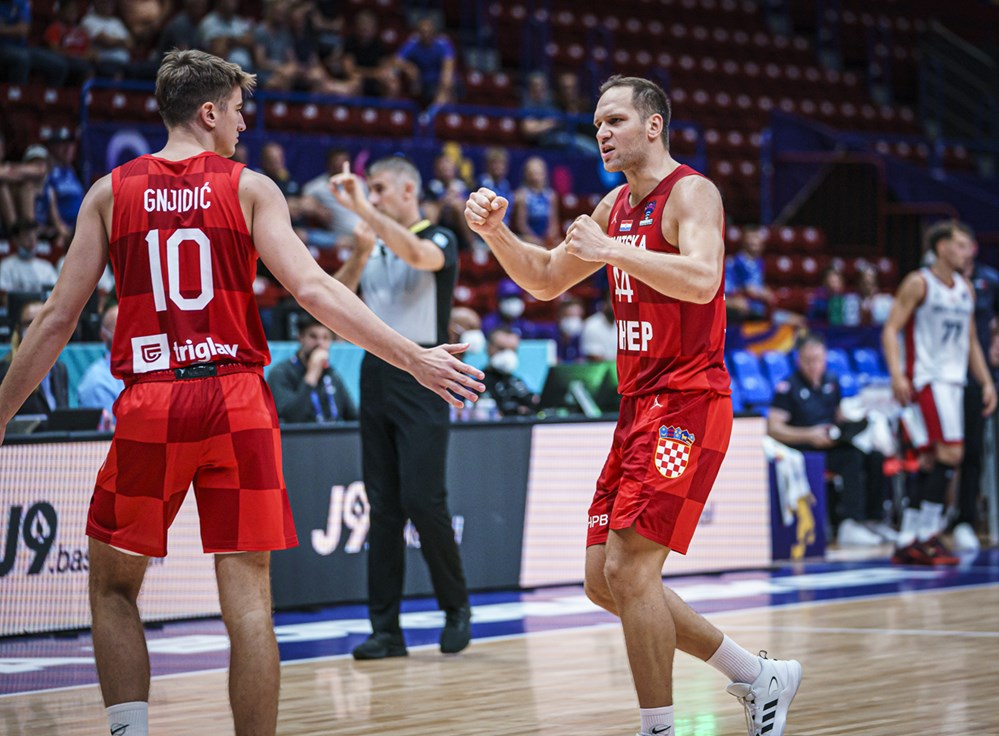
After the missed qualification for the World Cup next year, the Croatian Basketball Association decided to naturalize American Guard Jaleen Smith and so far that decision seems to bring the desired results for the team. The checkered team beat Poland and Switzerland during the pre-qualifier for WorldCup 2025 and now remains on track in Milano.
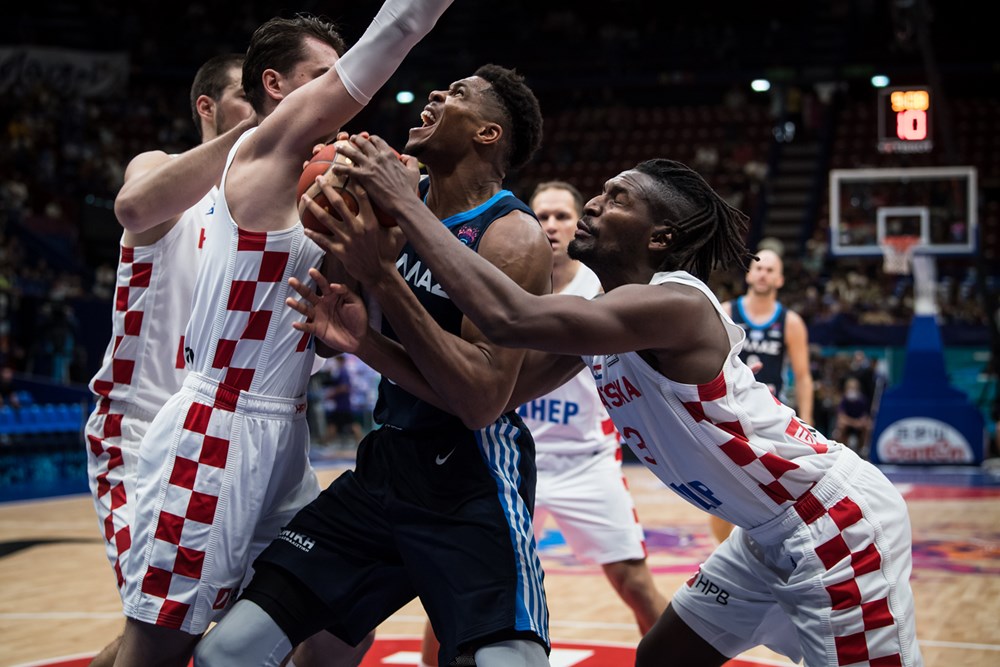
Yesterday, newly added Smith had to take on the big favorites from Greece around former NBA champion and MVP Giannis Antetokounmpo. The US-American eventually ended up being both the most effective player for Croatia and also top scorer with 23 points. Greek coach Dimitrios Itoudis on the other side was able to count on the "Greek Freak" Antetokounmpo not only to deliver 27 points during the entire game, but also to have two sensational blocks in the last 37 seconds of the game to stop two of Croatia's last three offenses and with that any hope for a big sensation. The game that seemed already lost at half- time 30:46 went to Greece 85:89 despite a strong second half by Croatia (55:43).
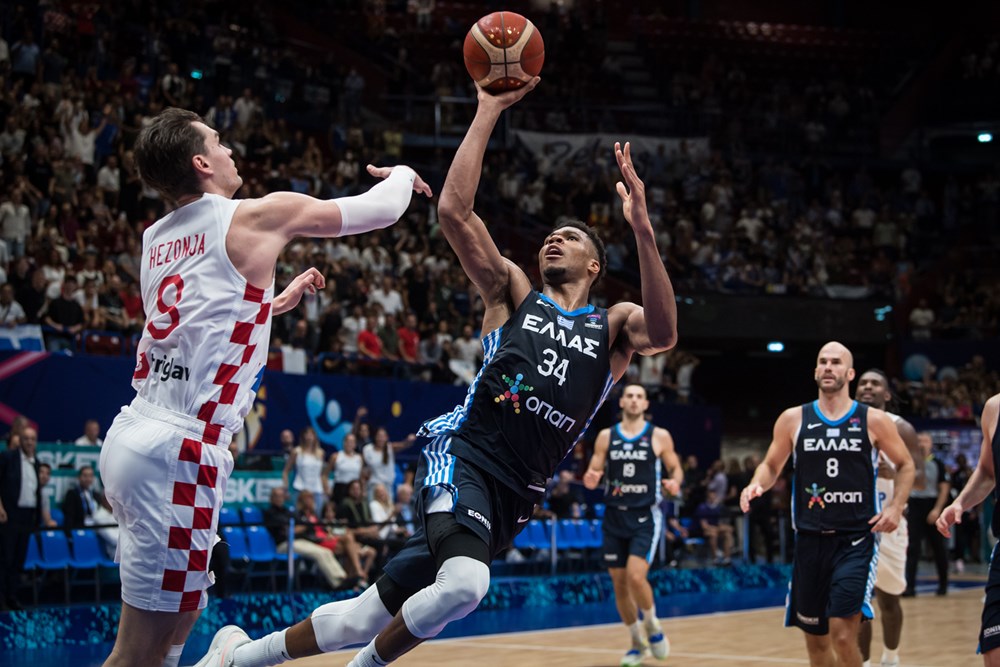
Today against Great Britain the Croatian team playing in red showed slight fatigue during the first half but kept the upper hand (37:31) against highly motivated opponents who had lost their opener against Ukraine 90:61. However the third quarter was a display of what the Croats around their leader and NBA player Bogdanović are capable of. A very convincing defense led to easy baskets up front and then eventually broke the Britons spirit when back-to-back alley-oops, fast-break dunks and three-pointers started. Dominic Mavra ended the 35-9 run with a triple point shot to beat the buzzer at the end of the quarter.
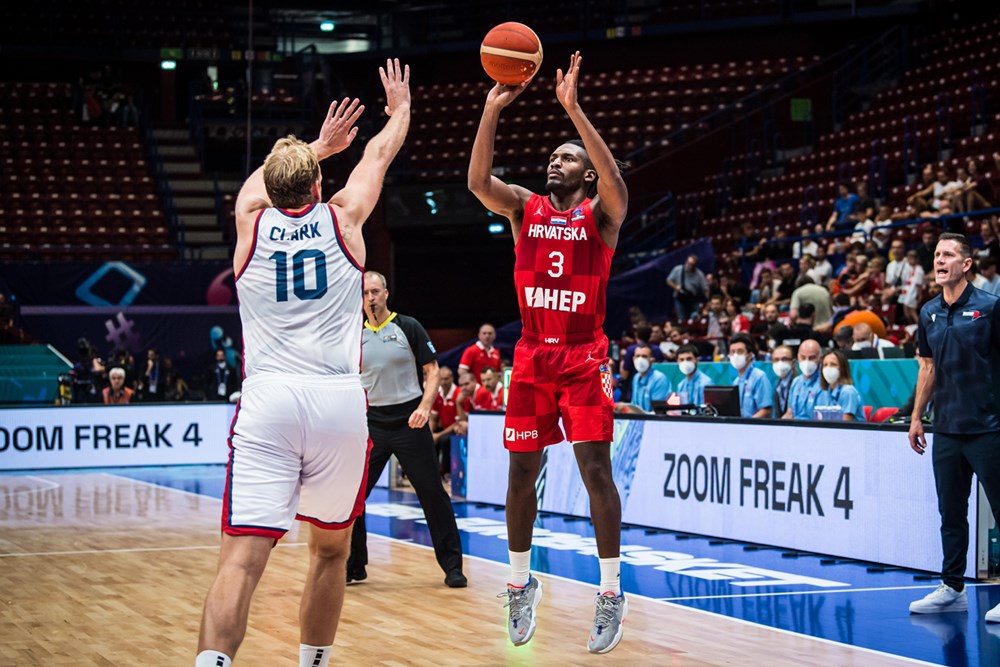
The game ended 86:85 with plenty of time for the Croatian bench players to soak in the large tournament atmosphere on the court. Unfortunately Karlo Matković had to leave the game injured at the beginning of the 4th quarter. Sarić, Žubac, Bogdanović all shared the top scores with 15 points each. Miles Hesson scored 18 points for Great Britain.
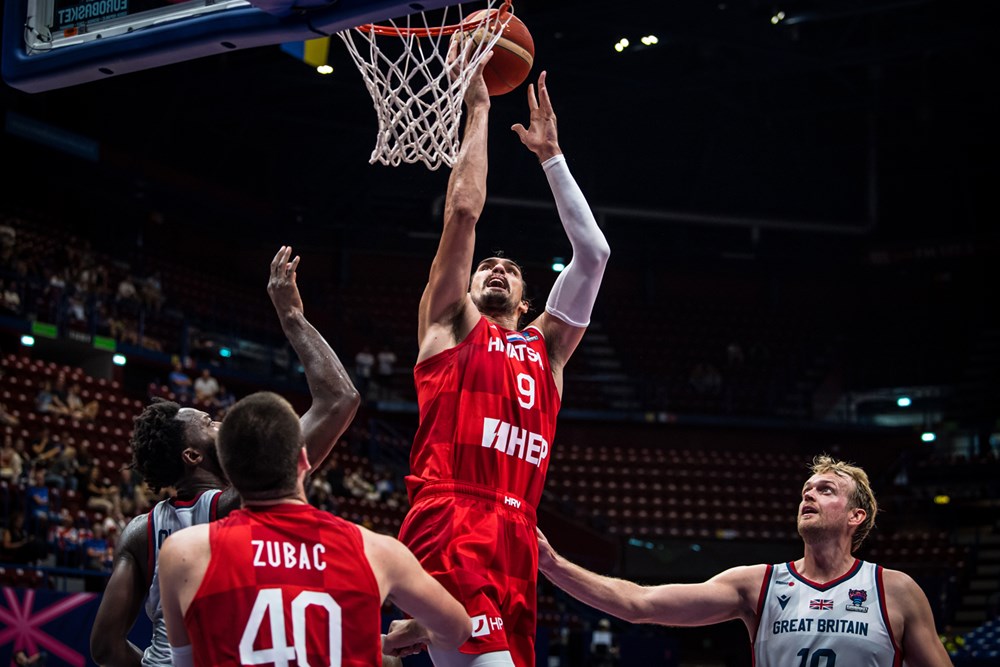
Next games (all in Milan) for Croatia will be:
Estonia on Monday Sep. 5 at 14:15
Italy on Tuesday Sep. 6 at 21:00
Ukraine on Thursday Sep. 8 at 14:15
All games will be televised live on HRT 2 and FIBA's YouTube channel
Results by quarters:
Croatia vs Greece 16:24, 14:22, 32:24, 23:19
Croatia vs Great Britain 20:17, 17:14, 35:9, 14:25
Box Score:
Foreign Minister Gordan Grlić Radman Thanks Greece For Post-Earthquake Aid
ZAGREB, 12 March, 2021 - Croatian Foreign Minister Gordan Grlić Radman on Friday thanked his Greek counterpart Nikolaos Dendias for his country's aid to Croatia after last year's devastating earthquakes.
"I'm taking this opportunity to thank Minister Dendias for the generous and prompt humanitarian aid that Greece sent to earthquake-hit areas in Croatia," Grlić Radman said in Athens, where he arrived for an official visit a day after visiting Cyprus.
"Greece itself was recently hit by strong earthquakes and I'm conveying our support and willingness to help," he added.
Greece was struck by two tremors earlier this month, the strongest measuring 6.3 on the Richter scale, which caused material damage but no fatalities.
Support for Croatia's membership bids
Grlić Radman also thanked Dendias for the Greek support for Croatia's accession to MED7, a group which comprises seven Mediterranean EU member states - Cyprus, France, Greece, Italy, Malta, Portugal and Spain.
He also thanked Dendias for supporting Croatia's accession to the Organisation for Economic Co-operation and Development and the euro and Schengen areas.
The two ministers underlined the importance of continuing EU enlargement to Southeast Europe and of Brussels having a consistent policy so that candidates do not lose the European perspective.
Grlić Radman cited Bosnia and Herzegovina, which is having a hard time managing the migrant crisis, and underlined solidarity with Greece, which is also on the front line of that "big political, security and economic problem."
The minister said they were pleased with the increase in Croatian-Greek trade, singling out the Greek company Avax, which is building access roads to the Pelješac Bridge in Croatia.
For more about earthquakes in Croatia, follow TCN's dedicated page.
Croatian Police Participating in Frontex Operations at Sea in Greece
ZAGREB, April 10, 2020 - Croatian maritime police are participating in two joint operations of the European border and coast guard agency Frontex at sea in Greece, the Ministry of the Interior said on Thursday.
After in early March this year the first contingent of four police officers was sent to Greece as part of Frontex's joint operation "Rapid Border Intervention 2020", on April 8 a second police contingent was sent to replace the first one and it will stay in Greece until the completion of the operation on May 6.
The first contingent performed all of their duties responsibly and professionally, for which they received written commendations from the FRONTEX director, the ministry said.
The mission on the Greek-Turkish border currently numbers 100 police officers from EU member-countries.
Depending on the circumstances, the duration of the operation may be extended and the police contingent participating in it may be expanded, the ministry said.
In addition to this operation, since 2015 the Ministry of the Interior has been continually providing strong support to Greece through the participation of its maritime police in the joint operation Poseidon, aimed at enhancing the control of the Greek-Turkish border at sea.
Croatian maritime police also help in operations to search for and rescue migrants and refugees at sea.
Croatian police have been helping Greece control its maritime border with two boats.
More news about migrant crisis can be found in the Politics section.
Croatian Interior Ministry to Send Border Patrol Vessel to Aegean Sea
The situation on the Greek-Turkish border, not all that far from Croatian territory, is gradually becoming worse and worse after Turkey opened its border to allow migrants to head towards Greece, and thus towards the EU. Frontex has now stepped up its game and the Croatian Interior Ministry has made itself available.
With numerous pieces of footage being released every now and then showing violent clashes between the authorities on the border and migrants seeking to enter the EU, it's difficult to remain neutral.
Owing to the escalating situation, Frontex has asked the Croatian Interior Ministry (MUP) to send another border patrol vessel down to the Aegean sea to attempt to prevent the entry of illegal migrants into the European Union (EU).
As Morski writes on the 7th of March, 2020, Croatia has responded to Frontex' request for another vessel to be deployed in the Aegean sea will soon send eight police officers, vehicles and equipment to the Greek-Turkish land border at their request, according to a recent report from Jutarnji list.
The officers, vehicles and other equipment from the Croatian Interior Ministry will be deployed as part of a Frontex force tasked with preventing illegal migrants from entering the territory of the European Union. In addition to manpower, Croatia has reported to Frontex the possibility of it sending another police ship complete with eight crew members into the Aegean sea to join in with Operation Poseidon.
This all regards a large Frontex operation to protect Greece's maritime border with that of Turkey, which is not an EU member state. At the moment, one Croatian police ship is already located down in Greece. Immediately after the seemingly provocative Turkish decision to open their border towards Greece for the illegal migrants, Frontex stepped up its forces along Greek borders in an attempt to protect EU territory.
The organisation boasts a rapid intervention force of 1,500 people, and all EU member states are required to declare forces for the unit. Croatia has declared about seventy of its police officers, and Frontex has so far requested eight people from the country, Jutarnji writes.
Make sure to follow our dedicated politics page for more.
Plenković: We All Stand in Solidarity with Greece
ZAGREB, March 3, 2020 - The European Union and each member state support and stand in solidarity with Greece, which is facing a wave of illegal migrants, Croatian Prime Minister Andrej Plenković said in Kastanies near the Greek-Turkish border on Tuesday.
As chairman of the Council of the EU, he visited the border together with Greek PM Kyriakos Mitsotakis, European Commission President Ursula von der Leyen, European Council President Charles Michel and European Parliament President Davide Sassoli.
They arrived to support Greece given its efforts to protect its own and thereby the external EU border, preventing illegal migration.
"We have sent the message that the EU and all member states will support and stand in solidarity with Greece," said Plenković.
The European leaders flew over the border area in a helicopter to see the situation on the ground. They were joined by Croatian Interior Minister Davor Božinović, who will chair an extraordinary meeting of EU interior ministers on this topic on Wednesday.
The Greek army, police and PM Mitsotakis briefed them on what is being done to protect the border.
"It's important that Greece, with its security forces, prevents a possible new illegal migration wave," said Plenković. He and his colleagues also visited the Greek police barricades on foot.
He said Greece would receive support from Frontex and a swift border response team as well as funding for that.
He said the situation was similar to 2015 and 2016 but with a key difference. "This Greek government, unlike the previous one (led by Alexis Tsipras), is controlling its border."
"After today's briefing, I believe Prime Minister Mitsotakis and the Greek authorities will guard their border," Plenković said.
EU leaders met in Kastanies amid increasing EU concerns about the arrival of thousands of migrants to the Greek border, after Turkey said it "opened its door" for refugees because dozens of Turkish soldiers had been killed in northern Syria.
Turkish President Recep Tayyip Erdogan said on Monday he had refused €1 billion in European aid for holding migrants in Turkey because the EU did not wish to "share the burden".
More news about the migrant crisis can be found in the Politics section.
Greek Company J&P Avax Selected to Build Pelješac Bridge Access Roads
ZAGREB, February 28, 2019 - The state-run Croatian Road operator (HC) has decided to select the Greek company J&P Avax to build the Duboka - Šparagovići/Zaradeze section of access roads to Pelješac Bridge at the price of 464.9 million kuna before Value Added Tax.
According to a press release issued by the HC on Thursday, a total of seven bids were submitted for the construction of the 12-kilometre long access road.
Of those seven bids, four were shortlisted, and the commission found the offer made by J&P Avax, to be the most favourable in financial terms.
The selected bidder is expected to wrap up the construction by 31 January 2022.
One of those seven bids was disqualified after the commission found that the listed price of 321.1 million kuna as offered by the Integral Inžinjerig company from Bosnia and Herzegovina was unusually low.
More news on the Pelješac Bridge construction can be found in the Business section.
Greek President Concludes Visit to Croatia, Speaks about Future of EU
ZAGREB, February 7, 2019 - European integration is imperative and a duty, Greek President Prokopios Pavlopoulos said during a lecture at Zagreb University on Wednesday, adding that he advocates stronger EU integration.
"It is imperative to have European integration and it is a duty to the founding fathers, EU residents and the rest of humankind," Pavlopoulos said in his lecture "The necessity of European integration."
Pavlopoulos calls for the EU's greater economic, monetary and security integration and for a common European foreign policy that will ensure the EU's status as a global power.
"We have to build a Europe that won't have centrifugal but rather centripetal forces. One that will make people who join proud, rather than have eurosceptics," he underscored and added that Europe is no longer attractive, it isn't a welfare state and the principle of solidarity enshrined in the EU treaties is lacking.
"We have to make Europe attractive, as it was when countries wanted to join Europe," he said, adding that one of the reasons for Brexit was the concept of the EU is no longer attractive.
Pavlopoulos said that the founding fathers considered the European project to be more than just a common economic space and that it should be able to act globally in order to defend "fundamental rights: representative democracy and all human rights."
He said that the EU, which will have a global role, needs to be built on a federal model and that it is necessary to advocate and fight for representative democracy and human rights so that Europe can act "not just on behalf of its own people but for the world and humankind in general," which he considers to be "Europe's historic responsibility."
Pavlopoulos said that two key "pillars" are required for European integration: a common foreign and security policy and a common economic policy.
He said that the EU treaties provide a basis for a common foreign and security policy and that it is a shame that this does not exist in reality.
"We have focused on the economy" and at key moments "we weren't there for the people and humankind," he said claiming that at critical moments Europe did not have a foreign or security policy, citing the case of the Middle East.
Other powers are interested in the Middle East for geostrategic reasons while the EU, which would have been present for humanitarian reasons, didn't have its own policy, he said and added that "a lot of things could have been avoided" had the EU had an active policy in that area.
"Europe has to be a global power," President Pavlopoulos said, noting that there is no other power that can act on the principle of democracy and protection of human rights.
In order for the EU to be a global power, it is essential that the EU's High Representative for Foreign Affairs and Security Policy has greater powers required to clearly define the EU's foreign policy objectives.
Pavlopoulos stressed that the eurozone is "the heart of the European Union," and that greater integration cannot occur if a strong eurozone doesn't exist.
On Tuesday, Pavlopoulos met with President Kolinda Grabar-Kitarović and said then that Greece supports Croatia's accession to the eurozone. "We have monetary convergence but we don't have economic convergence," he said, describing this as a paradox.
"You can't have a strong currency without a strong economy which is why we need institutions," he said, stressing the need to provide the European Central Bank with greater powers and to establish a European Monetary Fund.
He criticised the lack of an institutional framework that would encompass eurozone member states, given that the Eurogroup consists of informal meetings of eurozone finance ministers.
The Eurogroup made some essential decisions during the crisis in Greece, but there are no rules on how it acts, he added.
"We need to have rules stating how the Eurogroup will function and for it not to be a club of ministers where decisions are made by those who are strong," he said and added that the Eurogroup shouldn't just work for those who want the euro and only help their economies, implying Germany's policy during the Greek crisis.
Pavlopuolos underscored that the European Central Bank should have more power so that the EU can cope with a new financial crisis and global challenges.
He advocates the establishment of the European Monetary Fund, underscoring that the International Monetary Fund's solutions in implementing its measures requires devaluating currencies, which is not possible in the eurozone.
The European Commission supports transforming the European Stabilisation Mechanism into the European Monetary Fund which would be under the control of the European Parliament. The head of the International Monetary Fund, Christine Lagarde, has also expressed her support in this regard.
More news on the relations between Croatia and Greece can be found in the Politics section.
President of Greece Visits Croatia, Voices His Country's Support
ZAGREB, February 5, 2019 - Greece will always be on Croatia's side, as it showed during Croatia's accession to the European Union and to NATO, and it will show its support for Croatia's entry into the Schengen and euro zones too, the President of Greece, Prokopis Pavlopoulos, said on Tuesday after meeting in Zagreb with his Croatian counterpart President Kolinda Grabar-Kitarović.
Croatia needs the support of all EU member states for its accession to both zones. Slovenia's officials have hinted that Ljubljana might block Croatia's entry to Schengen due to the unresolved border dispute.
President Grabar-Kitarović said that "Croatia is investing a lot of effort to protect the EU's external borders and, once it joins the Schengen Area, it will do that even more effectively and will significantly contribute to the EU's overall security."
She added that Zagreb appreciates Greece's role in managing the migrant crisis as the first guard of the European borders.
"The Western Balkan route is still closed, but we call for constant caution because of the migrant pressure on that route," she warned and underscored that it was necessary to work on resolving the fundamental causes of migrations.
President Pavlopoulos hopes that 2020 will be important for Croatia's accession to the euro zone, as Croatia will chair the European Union in the first half of the year. Croatian Prime Minister Andrej Plenković has on several occasions announced that year as the year to introduce the euro in Croatia which is a legal obligation for all EU member states, with the exception of Denmark and Great Britain.
"We are here to help governments in our countries that will decide on that. We advocate that our countries cooperate better at the economic and other levels," Pavlopoulos said. In Greece, the president's role is ceremonial.
Speaking about economic cooperation between the two countries, Grabar-Kitarović underscored that it was fairly modest with regard to trade and investments. "Investments are very low. Croatian investments in Greece are almost non-existent and Greece is, unfortunately, not among the 40 top investors in Croatia," she said.
Croatia's most exported commodity to Greece is sugar, iron and steel products, textile products, fertilisers and medicines, while Greece's exports to Croatia include citrus fruits, textile products and aluminium products.
Grabar-Kitarović sees potential for further cooperation in strengthening ties in tourism, maritime and land transport, establishing direct flights between Croatian and Greek cities, and many other areas.
She recalled that Croatia is a signatory to the memorandum of understanding with Albania and Montenegro for the construction of the Adriatic-Ionian gas pipeline that will connect to the pipeline currently under construction in Greece.
The two heads of state support the completion of the Adriatic-Ionian transport route which would connect their two seas and Croatian and Greek ports.
Pavlopoulos said Athens and Zagreb, "because of the vision of its fathers", had the duty to support the further unification of Europe and, together with Romania and Bulgaria, build the EU's southeast pillar.
He said all neighbouring countries must join the EU because "the bigger it is, the better for it as well as for the whole world," but first they must meet requirements such as the rule of law and the adoption of the acquis.
He also spoke of North Macedonia, the state which, as of January, has a new name after the Greek and Macedonian parliaments adopted a historic agreement to that effect.
"We Greeks are here to help it on the path to NATO and the EU, but also to convince it that, without respecting the law and eradicating any irredentism, it can't make progress on that path," Pavlopoulos said, adding that the same applied to Albania.
He said the EU must be built on the federal principle and that it was a union of people, but with a global role which other world powers should have too.
"There is no other power in the world that can better push for peace, humanism, democracy and the law. We must defend our peoples as well as all of humanity in this delicate period," he said, referring to European elections in May at which populist parties are expected to rise in popularity.
"Skeletons of the past are being awakened. We must take action to resist those threats. Europe was built on the rubble of World War II and we must fight so that something like that doesn't happen ever again," Pavlopoulos said.
He said his next meeting with Grabar-Kitarović would take place in October.
Grabar-Kitarovic spoke of the historical links between the two countries. "The Aegean and the Adriatic Seas have linked us for millennia and traces of ancient Greek culture are visible in Dalmatia, on several Croatian islands, including in the northern Adriatic, where Lošinj has one of the most beautiful and well-preserved Apoxyomenos sculptures."
She said many Croats of Greek descent had left a strong mark in Croatia, including 19th century dramatist Dimitrije Demeter and 20th century composer Boris Papandopulo.
Pavlopoulos is staying in Croatia two days and will also meet with Parliament Speaker Gordan Jandroković and Prime Minister Andrej Plenković.
More news on the relations between Croatia and Greece can be found in the Politics section.
Croatia Ready to Help Greece Fight Wildfires
ZAGREB, July 24, 2018 - Croatia's Defence Ministry is ready to send two firefighting planes to Greece to help in efforts to put out wildfires, the ministry said in a statement on Tuesday.


